In today’s fast-paced world, mental health apps have become a go-to resource for many of us looking to improve our well-being. Mindfulness, the practice of being fully present and engaged in the moment, plays a significant role in this journey.
It’s all about tuning into our thoughts and feelings without judgment, which can help us tackle stress, manage anxiety, and foster a greater sense of peace.
As more people discover the incredible benefits of mindfulness, the rise of mindfulness apps has made it easier than ever to weave these practices into our daily lives. Whether you’re a busy professional, a student, or anyone in between, these apps offer everything from guided meditations to breathing exercises and mood tracking—all right at your fingertips.
They empower us to take charge of our mental health, making mindfulness accessible anytime and anywhere. So, if you’re ready to embrace a healthier, more balanced life, these tools can be a fantastic first step!
Benefits of Mental Health Apps
Mental health apps offer a wide range of benefits for individuals looking to improve their overall well-being. These apps can be particularly helpful in reducing stress, enhancing emotional regulation, boosting focus and concentration, and improving sleep quality.
Let’s explore each of these benefits in more detail:
Stress Reduction and Relaxation
Mental health apps often incorporate mindfulness and relaxation techniques to help users manage stress. These apps guide individuals through various exercises, such as deep breathing, body scans, and guided meditations.
Research has shown that mindfulness practices can significantly lower stress levels by reducing physiological arousal and promoting relaxation. A study published in Health Psychology Review found that mindfulness interventions led to moderate reductions in stress among participants, highlighting the effectiveness of these techniques in alleviating anxiety and promoting a sense of calm.
Improved Emotional Well-being
Mental health apps play a crucial role in fostering emotional resilience by encouraging users to observe their thoughts and feelings non-judgmentally. These apps often incorporate techniques that prompt users to acknowledge their emotions without labeling them as “good” or “bad”.
Regular use of mental health apps can enhance emotional well-being by teaching users how to cope with challenging emotions. For example, an app might guide users through a meditation focused on self-compassion, helping them cultivate kindness toward themselves during difficult times.
Enhanced Focus and Concentration
In a world filled with digital distractions, mental health apps can significantly improve focus and concentration by encouraging users to practice being present. Research indicates that mindfulness practice can enhance cognitive flexibility and attention span.
Mental health apps provide users with techniques to combat distraction, such as short meditations designed to refocus the mind and improve productivity.
By promoting mindfulness, these apps can help individuals navigate the challenges of a digitally distracted world and enhance their overall cognitive function.
Sleep Quality Improvement
Many mental health apps include features specifically designed to assist users in winding down and preparing for restful sleep. From soothing soundscapes to bedtime stories, these apps provide a variety of resources to help users relax before bed.
Studies have shown that mindfulness practices can lead to better sleep quality and reduced insomnia symptoms. A review published in JAMA Internal Medicine found that mindfulness meditation improved sleep quality and reduced insomnia, demonstrating the potential of these apps to enhance sleep.
By harnessing the power of mindfulness and relaxation techniques, mental health apps offer valuable tools for stress reduction, emotional well-being, focus enhancement, and improved sleep quality. As we navigate the complexities of modern life, incorporating these apps into our daily routines can be a transformative step toward better mental health.

Key Features of Effective Mental Health Apps
In the digital age, mental health apps have emerged as valuable tools for enhancing well-being and providing support for various mental health challenges. These apps come equipped with features designed to engage users and promote mindfulness. Here are the key features that make mental health apps effective:
Guided Meditation Sessions
One of the most important features of mental health apps is guided meditation sessions. These sessions provide structured support for users, whether they are beginners or experienced practitioners.
- Importance for Beginners and Experienced Users: For beginners, guided sessions offer clear instructions and help ease them into meditation. Experienced users can explore new techniques and deepen their practice. Apps like Headspace and Calm provide a diverse range of sessions tailored to different needs, such as stress relief, sleep, and focus.
Breathing Exercises
Breathing exercises are a fundamental aspect of mindfulness and are often included in mental health apps to help users manage stress.
- Variety of Techniques Offered: Effective apps provide a range of breathing techniques, from simple deep breathing to advanced methods like box breathing. These exercises can be particularly beneficial in moments of high anxiety, allowing users to quickly regain a sense of calm.
Progress Tracking
Tracking progress is a powerful feature that enhances user engagement and motivation.
- How Tracking Progress Enhances Engagement: Many mental health apps allow users to log their meditation sessions, track their mood, and monitor their progress over time. This feature encourages consistency and accountability. For example, Calm includes a “Calm Streak” feature that rewards users for consecutive days of practice, fostering a sense of achievement.
Mindful Reminders
Integrating mindfulness into daily routines can be challenging, but mindful reminders can help.
- Integration of Mindfulness Practices: Many apps offer customizable reminders that prompt users to take a moment to pause and practice mindfulness throughout the day. These reminders can serve as gentle nudges to stay present, even during busy times. Apps like Insight Timer allow users to set reminders for their mindfulness practice.
Sleep Improvement Features
Quality sleep is crucial for mental health, and many mental health apps include specific tools designed to facilitate better sleep.
- Specific Tools Designed to Facilitate Better Sleep: Features such as sleep meditations, calming soundscapes, and bedtime stories help users unwind and prepare for restful sleep. For instance, Calm offers a section dedicated to sleep, featuring sleep stories narrated by soothing voices to help users relax.
Mood Tracking and Reflection
Mindfulness apps can assist users in gaining self-awareness through mood tracking and reflection.
- Benefits of Logging Emotional States: By encouraging users to log their moods and emotions, these apps help individuals identify patterns and triggers in their emotional experiences. This practice can lead to greater self-awareness and emotional regulation. Apps like Stop, Breathe & Think prompt users to check in with their feelings before and after meditation sessions.
Personalized Meditation Plans
Effective mental health apps recognize that each user is unique and often offer personalized meditation plans.
- Customization Based on User Preferences and Goals: Many apps allow users to tailor their meditation experience based on their goals, preferences, and experience levels. For example, Headspace uses an initial questionnaire to create a personalized meditation plan that aligns with the user’s needs, ensuring a more engaging and effective practice.
Gamification Elements
Gamification can enhance user interest and motivation in mental health apps.
- Use of Challenges and Rewards: Features such as challenges, achievements, and rewards can make mindfulness practice feel more engaging. For instance, Calm includes daily challenges that encourage users to complete specific meditation sessions, unlocking rewards and achievements along the way.
Gratitude Journaling
Gratitude journaling is a practice that encourages users to focus on the positive aspects of their lives.
- Encouragement of Positive Thinking: Some mental health apps incorporate gratitude journaling features, allowing users to reflect on what they are thankful for each day. This practice can help shift focus away from negative thoughts and cultivate a more positive mindset. Apps like Simple Habit offer dedicated sections for gratitude journaling, promoting emotional well-being.
By incorporating these key features, mental health apps provide a comprehensive and engaging experience for users looking to enhance their mental health. Whether through guided meditations, breathing exercises, or personalized plans, these apps offer valuable tools to support individuals on their mindfulness journey.

Review of Top Mental Health Apps
1. Headspace
Overview of Features: Headspace is a leading meditation app that offers a wide array of guided meditation sessions, sleep aids, and mindfulness exercises. Its user-friendly interface and engaging content make it accessible for both beginners and experienced users. The app includes various themed meditations focused on stress relief, sleep improvement, and emotional well-being.
User Experience: Users have praised Headspace for its intuitive design and short onboarding process, which allows new users to quickly get started. The app utilizes colorful imagery and inclusive artwork to create a welcoming environment. Additionally, it incorporates gamification elements, encouraging users to complete meditation levels and track their progress.
Effectiveness Ratings: Research indicates that Headspace can lead to significant improvements in mental health outcomes. Studies have shown that users experience reductions in stress, increased focus, and enhanced emotional well-being after using the app. For instance, a study found that just 10 days of using Headspace led to a 14% reduction in stress levels and a 23% increase in compassion among users.
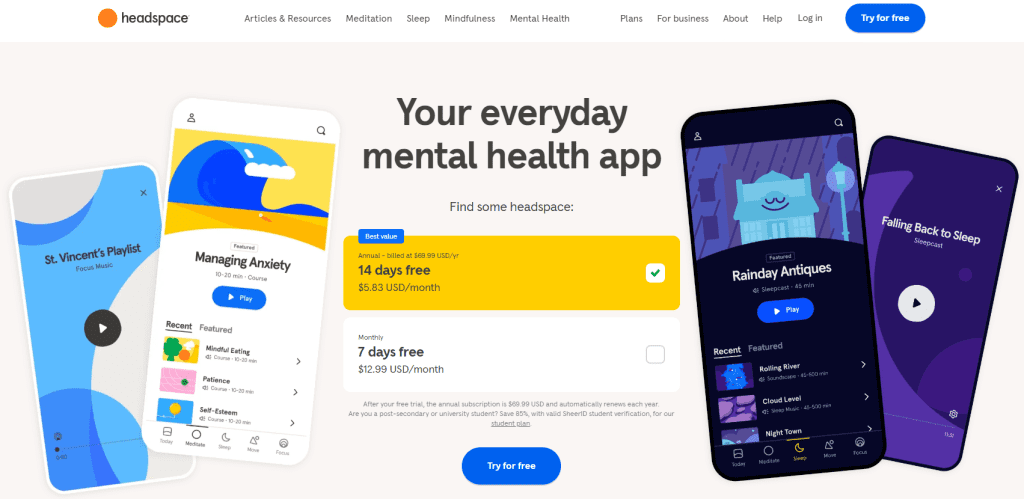
2. Calm
Discussion of Content Variety: Calm is another popular mental health app that offers a diverse range of content, including guided meditations, sleep stories, and soothing soundscapes. The app caters to various needs, from anxiety relief to improved sleep quality, making it suitable for users at different stages of their mindfulness journey.
User Engagement Strategies: Calm employs various strategies to keep users engaged, such as daily meditations, themed series, and a library of sleep stories narrated by well-known voices. The app also provides users with personalized recommendations based on their preferences and previous activities, enhancing the overall user experience.
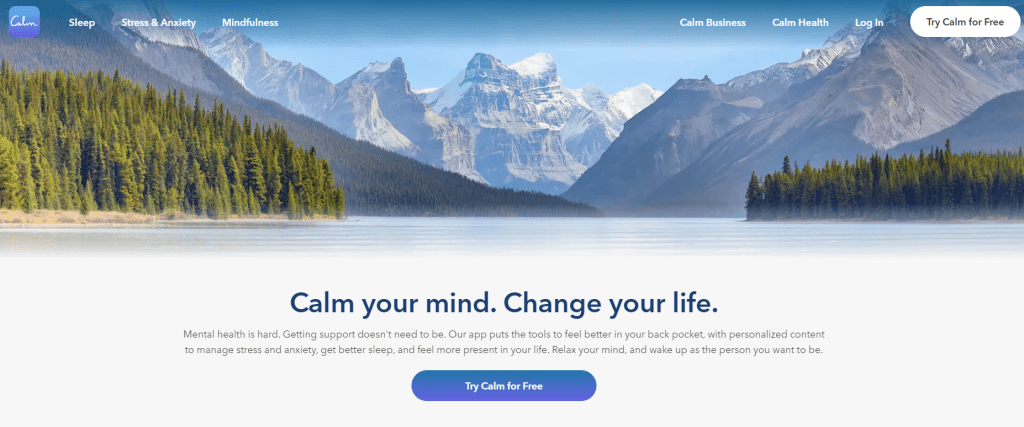
3. Insight Timer
Community Features: Insight Timer stands out for its strong community aspect, offering users the opportunity to connect with others through forums and group meditations. The app boasts an extensive library of free meditations, talks, and courses led by mindfulness experts from around the world.
Extensive Content Offerings: With over 100,000 free meditations, Insight Timer provides a wealth of resources for users. The app also features a timer for self-guided meditations, allowing users to customize their practice. This combination of community engagement and extensive content makes Insight Timer a unique choice for those seeking a supportive mindfulness environment.
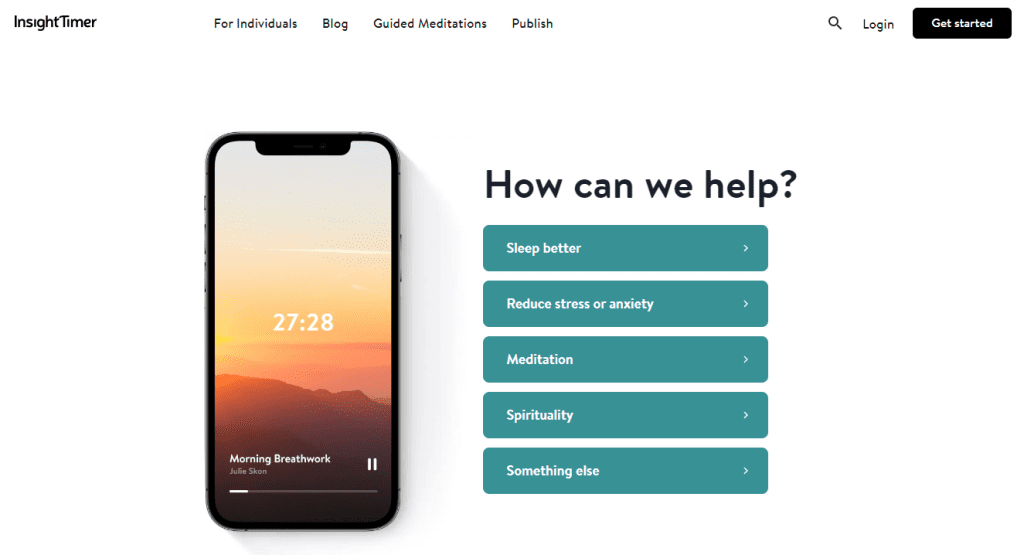
4. Smiling Mind
Targeted Programs for Specific Demographics: Smiling Mind is designed with a focus on younger audiences, offering tailored programs for children and adolescents. The app aims to promote mental well-being among youth by providing age-appropriate mindfulness exercises and educational resources.
User Experience: The app’s interface is engaging and easy to navigate, making it suitable for younger users. By incorporating mindfulness practices into school curricula and home life, Smiling Mind helps children develop valuable coping skills and emotional resilience.
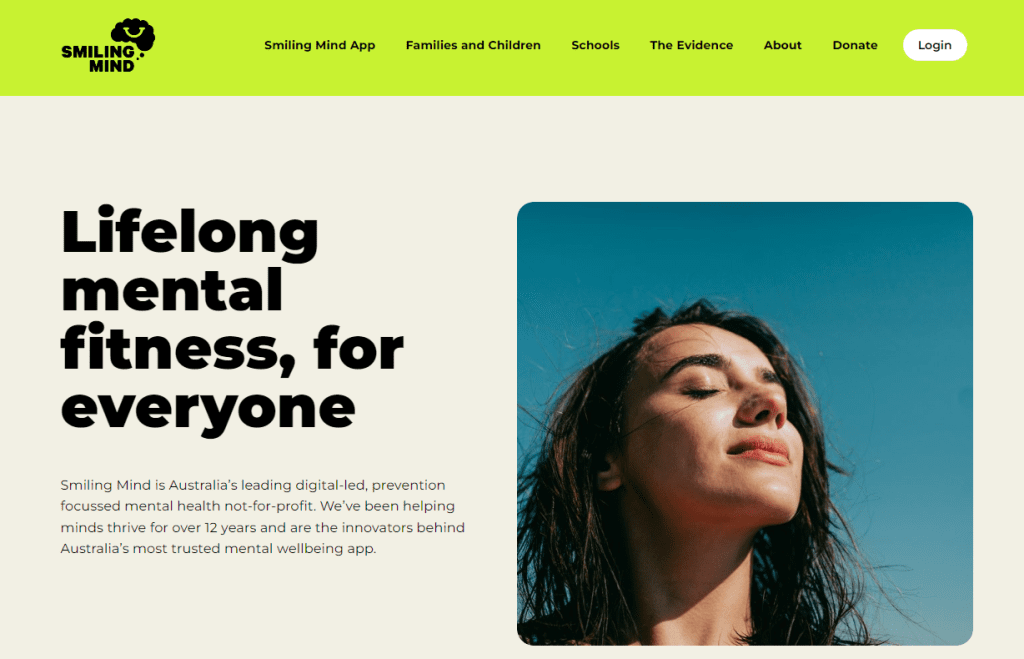
5. 10% Happier
Focus on Practical Mindfulness Techniques: 10% Happier is geared toward skeptics of meditation, providing practical mindfulness techniques that fit into busy lifestyles. The app features a variety of courses led by renowned mindfulness experts, making it approachable for those new to meditation.
User Experience: The app emphasizes a straightforward approach to mindfulness, offering bite-sized lessons and guided meditations that can be easily integrated into daily routines. This practical focus makes 10% Happier an excellent choice for individuals looking to enhance their mental well-being without feeling overwhelmed.
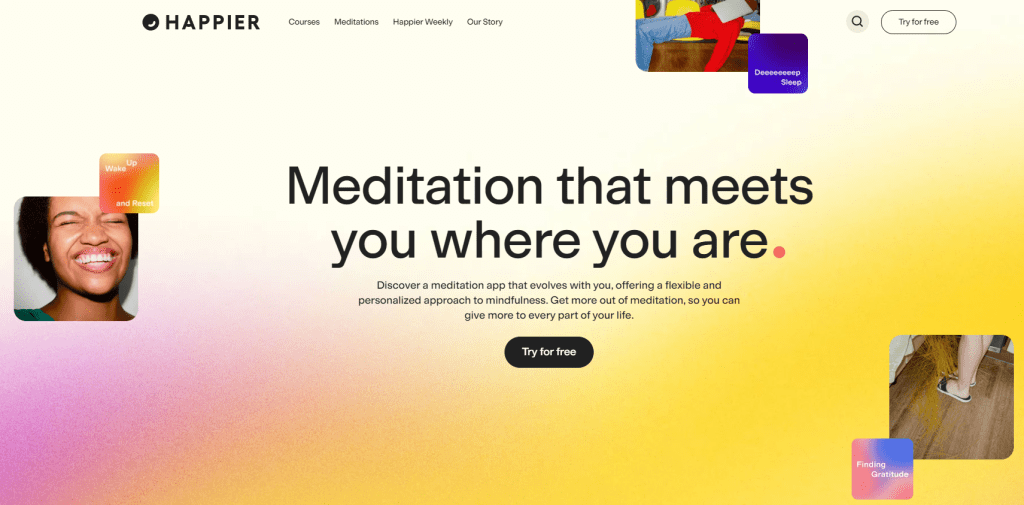
Challenges in Mental Health App Development
Developing effective mental health apps presents unique challenges that developers must navigate to create successful and impactful solutions. Here are some of the key challenges faced in this field:
User Retention
Importance of Promoting Consistent Use for Effectiveness: One of the primary challenges in mental health app development is ensuring user retention. While many users may download an app with enthusiasm, maintaining their interest over the long term can be difficult.
- Initial Enthusiasm vs. Long-Term Commitment: Users often start with high expectations but may struggle to integrate the app into their daily routines. To combat this, developers need to create engaging content and features that encourage regular use.
- Gamification and Dynamic Content: Incorporating gamification elements, such as challenges and rewards, can help keep users motivated. Regularly updating content and introducing new features can also prevent monotony and routine fatigue.
Guidance for Beginners
Need for Clear Instructions and Support for New Users: Mental health apps must provide clear guidance for users, especially those who are new to mindfulness or mental health practices.
- Onboarding Experience: A smooth onboarding process is essential for helping users understand how to use the app effectively. This can include tutorials, walkthroughs, and easy access to support resources.
- In-App Support: Providing in-app support, such as chat features or access to mental health professionals, can help users feel more comfortable and supported as they navigate their mental health journey.
Quality and Efficacy
Variability in App Quality and the Need for Evidence-Based Practices: The mental health app market is saturated with options, leading to variability in quality and effectiveness.
- Evidence-Based Practices: Developers must ensure that their apps are grounded in well-researched therapeutic approaches. Collaborating with mental health professionals during the development process can help create apps that are both effective and safe for users.
- User Testing and Feedback: Comprehensive usability testing is crucial to identify potential issues and ensure that the app meets the needs of its target audience. Gathering user feedback can help refine features and improve overall user experience.
Future Directions and Research Needs
As the landscape of mental health apps continues to evolve, several areas require further exploration and research:
Impact on Psychological Processes
Summary of Research Findings on Mindfulness Apps and Psychological Change: Research has shown that mindfulness apps can lead to significant improvements in mental health outcomes, including reductions in anxiety, depression, and stress. However, more studies are needed to understand the long-term effects of these apps on psychological processes and overall well-being.
- Need for Comprehensive Studies: Future research should focus on the effectiveness of specific features within mental health apps and how they contribute to positive psychological change. This includes examining the impact of guided meditations, mood tracking, and community support on user outcomes.
Integration into Clinical Practice
Considerations for Clinicians in Recommending Mindfulness Apps: As mental health apps gain popularity, it is essential for clinicians to understand how to incorporate these tools into traditional treatment approaches.
- Guidance for Clinicians: Mental health professionals should be equipped with knowledge about the available apps and their evidence-based practices. This will enable them to recommend suitable options to their clients and integrate app usage into their treatment plans.
- Monitoring and Support: Clinicians can play a vital role in monitoring their clients’ use of mental health apps, providing support, and addressing any concerns that may arise during the process.
Final Thoughts
Mental health apps have emerged as powerful tools for enhancing well-being through the practice of mindfulness. By providing accessible resources, engaging features, and a supportive community, these apps empower individuals to take charge of their mental health.
Whether you’re looking to reduce stress, improve emotional regulation, boost focus and concentration, or get better sleep, mindfulness apps offer a range of benefits tailored to different needs and preferences.
As the research has shown, consistent use of these apps can lead to significant improvements in mental health outcomes. Studies have demonstrated the efficacy of apps like Headspace, Calm, and Insight Timer in alleviating anxiety, depression, and stress, while also enhancing overall well-being and cognitive performance.
However, it’s important to note that while mindfulness apps can be a valuable supplement to traditional mental health treatments, they are not a replacement for professional care. If you’re struggling with a mental health condition, it’s always best to seek guidance from a licensed therapist or psychiatrist.
As you embark on your journey to better mental health, consider incorporating a mindfulness app into your daily routine. Experiment with different apps, explore their features, and find one that resonates with you.
Remember, the key is consistency – even just a few minutes of mindfulness practice each day can make a significant difference in your overall well-being.
By embracing the power of mindfulness and leveraging the tools provided by mental health apps, you can take proactive steps toward a healthier, more balanced life. So, why not give it a try? Your mind and body will thank you.








